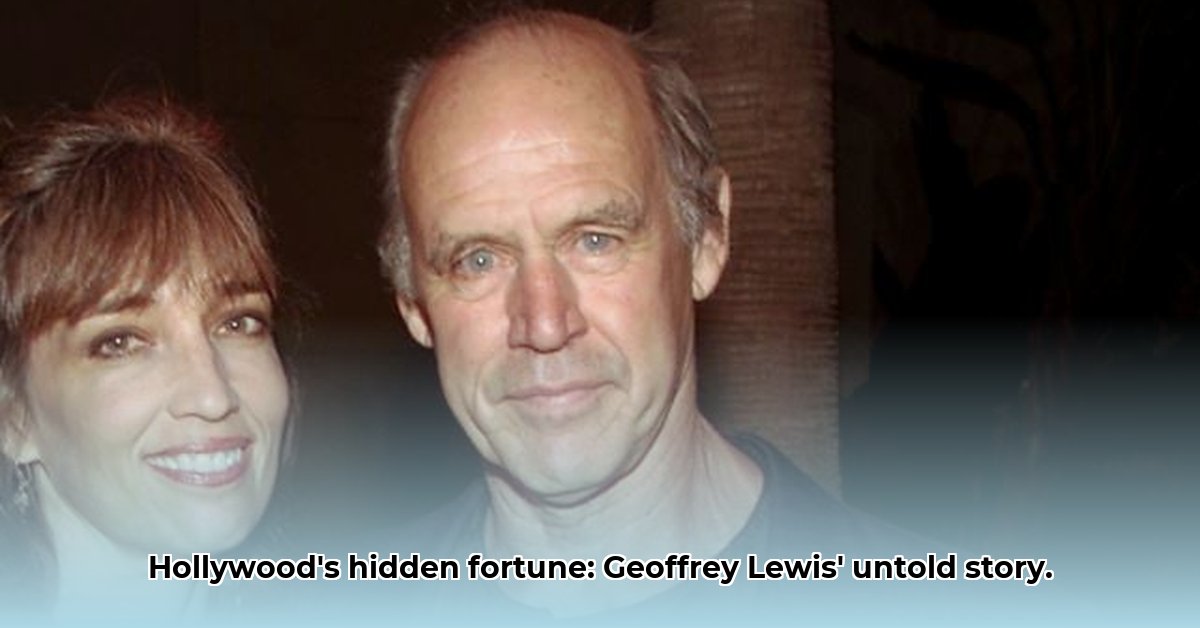
A Life in Supporting Roles: Examining Geoffrey Lewis's Legacy
Geoffrey Lewis. The name might not immediately conjure images of Hollywood royalty, yet his ruggedly handsome face is instantly recognizable to countless moviegoers. He appeared in over 200 films and television shows, often stealing scenes with his unique brand of quirky charm and dramatic intensity. But how did this prolific career translate into his estimated net worth of $2 million? This isn't simply a question of numbers; it's a story of Hollywood economics, the value of versatility, and the lasting legacy of a character actor whose impact far exceeded his financial compensation. For more on character actor finances, see this actor net worth example.
Unraveling the Enigma: Factors Affecting Geoffrey Lewis's Net Worth
Understanding Geoffrey Lewis's net worth requires a multifaceted approach. While a $2 million figure provides a starting point, a deeper dive into the complexities of his career reveals a more nuanced picture. Several key factors shaped his overall financial standing:
Compensation for Supporting Roles: As a predominantly supporting actor, Lewis's salary likely paled in comparison to the leading men he frequently shared the screen with. Historical data on character actor pay illustrates this disparity. While his contributions to a film's success were undeniable, the structure of Hollywood's compensation system often disproportionately favors leading roles.
The Economics of Hollywood Filmmaking: The distribution of profits in Hollywood is far from straightforward. Lewis's contracts, like those of many supporting actors, likely granted him a comparatively smaller share of film revenues, despite the substantial box office success of many of his films. The system isn't inherently equitable; profit margins often favor those in more prominent roles.
Financial Obligations: The expenses associated with maintaining a career in Hollywood – agent fees, taxes, legal costs, and other overhead – significantly impact an actor's net worth. These deductions, often substantial, further complicate the calculation of his actual earnings.
Investments and Other Income: Information regarding Lewis's investments and other income streams remains largely unavailable. The $2 million figure likely only reflects income directly attributable to his acting career, excluding any potential income from other ventures.
A Master of Supporting Roles: Collaboration and Versatility
Geoffrey Lewis's career was defined by his collaborations, most notably his work with Clint Eastwood in seven films, including the immensely popular Every Which Way But Loose series. In these films, he wasn't simply a background figure; his memorable performances were integral to the movies’ overall success. His ability to seamlessly blend comedy and drama further cemented his versatility. This range allowed him consistent work, yet perhaps limited his earning potential, given that typecasting into a leading man role might have increased his earning power. However, his versatility was a strength — preventing career stagnation while forging a uniquely eclectic body of work.
Wasn't Geoffrey Lewis's enduring appeal and remarkable versatility a crucial factor in his career longevity, even if it didn't translate directly into a higher net worth? Wouldn't a more focused, specialized career path potentially yield greater financial rewards but risk sacrificing artistic exploration?
Beyond the Bank Account: The Enduring Legacy of Geoffrey Lewis
While the financial aspect of Geoffrey Lewis's life remains intriguing, his true legacy transcends mere monetary value. His daughter, Juliette Lewis, herself a successful actress, carries forward the family's contribution to Hollywood. Furthermore, his consistent work and memorable performances have secured his place in cinematic history. Was this not a unique form of success, exceeding the limitations of simple financial metrics?
Conclusion: A Complex Narrative
The $2 million estimate of Geoffrey Lewis's net worth presents a fascinating paradox. It highlights the discrepancy between widespread recognition and substantial financial wealth within the entertainment industry. Ultimately, his story is one of a remarkable career, marked by consistent work, memorable performances, and a substantial legacy that resonates far beyond the numbers. It underscores the need to consider the complexities of Hollywood economics and the often-unseen realities of financial management for character actors. The ongoing investigation into his financial history serves as a compelling reminder that fame, success, and legacy are not necessarily equated with monetary wealth.
Geoff Lewis Net Worth
Content about geoff lewis net worth (Auto-generated fallback due to API error).